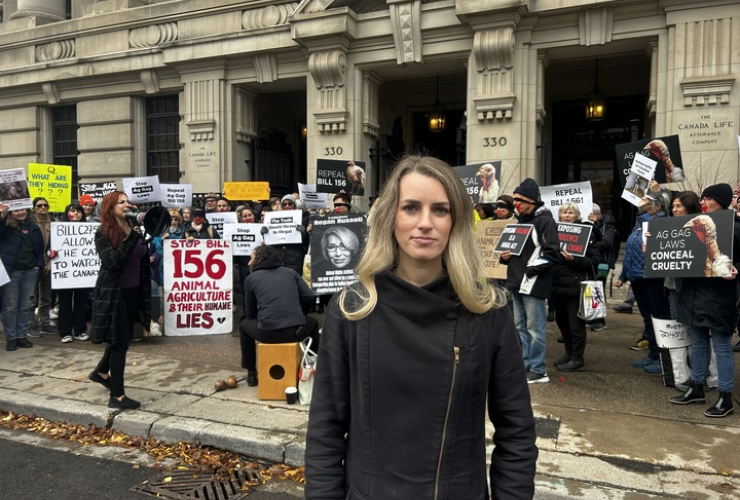Advocacy group Animal Justice is calling for legislation requiring cameras inside farms and slaughterhouses to improve transparency, accountability and the humane treatment of animals in the agricultural industry.
The group released secretly recorded video exposing what it describes as a shocking failure of the legal system to protect animals on farms at Excelsior Hog Farm, a factory farm in Abbotsford, B.C. The video, which it says was shot between April and June this year, shows pigs enduring abuse, injuries and neglect.
Animal Justice says it obtained the footage confidentially and claims to show dead and rotting pigs scattered throughout the farm, crushed and stillborn piglets in crates, pigs being kicked, jabbed with metal rods and hit with plastic boards, and animals with bloody lacerations and open wounds.
The Binnendyk family, owners of the farm, released a statement Friday saying much of the content of the video was old and previously aired in 2019. Since then, the British Columbia Society for the Prevention of Cruelty to Animals (BC SPCA) has reviewed production practices and animal welfare standards on the farm and no sanctions or actions resulted, the statement said. "Excelsior Hog Farm is in compliance with all national food safety and animal care programs. As livestock farmers, the welfare and well-being of the animals under our care have been and will continue to be of utmost concern and consideration for us," reads the statement shared with media.
The video has been turned over to the BC SPCA along with a detailed legal complaint pointing out violations of the Prevention of Cruelty to Animals Act and the Criminal Code, Animal Justice members said. In an online statement, the BC SPCA said it has not yet received the raw video footage from the group. However, the publicly available video is cause for concern, it said.
“The BC SPCA has reviewed the publicly available footage, which contains very disturbing visuals appearing to depict violations of the PCA Act, the Criminal Code and seemingly showcases practices that are not in accordance with National Farm Animal Codes of Practice, which are fully endorsed by the BC Pork Council for use on pig farms across the province,” reads the statement. BC SPCA said the video shows injured pigs, metal rods used on faces, and unsanitary conditions, including dead piglets with live animals — all potentially constituting unlawful activities or practices below industry standards for pig producers.
“The ongoing suffering of sensitive pigs and piglets at Excelsior Hog Farm represents a shocking failure of our legal system to protect animals on farms,” said lawyer Camille Labchuk, executive director of Animal Justice.
“Instead of prosecuting whistleblowers, authorities should act immediately to end the gut-wrenching abuse. It’s time for B.C. to introduce legal standards for animal welfare on farms and proactive inspections so that animal suffering no longer remains hidden.”
However, the Binnendyk statement cast doubts on the motives of the animal rights group. “Reasonable Canadians should ask themselves about the motives behind these well-funded professional protesters,” the farm family’s statement added. “We believe that their true motive is to seek to eliminate all animal farming and animal protein consumption. They will use any means necessary, including breaking and entering, trespassing, manipulated footage, imported protesters, ‘gotcha’ clickbait embedded media, threats of violence to our families, and high-priced lawyers.”
Labchuk said that currently, there is no law in B.C. or anywhere else in Canada requiring cameras at farms or slaughterhouses. In contrast, slaughterhouses in several other jurisdictions, such as the U.K., Spain and the Netherlands, are obligated to have cameras and the footage captured in those locations primarily serves as a tool to aid in enforcement efforts, she said.
“Right now, the lives of farmed animals are kept hidden from the public, as animals are mainly housed behind closed doors on private property. Consumers don't have the right to visit the farms that supply their food, so there is a severe lack of transparency about food production,” said Labchuk.
The situation is worsened because farm animal welfare isn't proactively regulated by the government and there are no government inspections of farm animals’ living conditions, Labchuk told Canada’s National Observer. This means the only chance the public has to see these conditions is when a whistleblower shares footage, said Labchuk.
“Instead, it would be better for farms to become fully transparent and be required to broadcast their operations for all to see. Farmers continually claim to have high animal welfare standards, so they should feel like they have nothing to hide.”
According to Animal Justice, this is not the first time Excelsior Hog Farm has faced allegations of animal abuse. In 2019, a similar video exposed mother pigs confined in tiny crates with dead and dying piglets, electric prods used on pigs' faces, untreated injuries and workers performing painful procedures without apparent relief for the animals.
Animal Justice claims Excelsior and its owners have never faced legal consequences for the troubling conditions previously documented on camera. Instead, whistleblowers who exposed the abuse faced legal prosecution.
The group also said members of the public who participated in a peaceful sit-in at the farm in 2019, livestreaming conditions inside the barn, were later convicted of criminal break-and-enter and mischief. Their sentence of 30 days in jail for exposing animal cruelty is reportedly the only known jail sentence in Canadian history for a non-violent act of civil disobedience, the group added.
B.C.’s Ministry of Agriculture and Food said on Friday it is disturbing to see images of animal abuse and recognizes people care deeply about this issue.
“Ensuring animals are treated ethically and with care is a priority for our government and B.C. producers, which is why, at the direction of the deputy minister, Ministry of Agriculture and Food staff initiated a comprehensive review of B.C.'s farmed animal welfare framework in late 2022 to ensure it is strong and remains strong in the future,” reads a statement from the ministry. “Over the past year, ministry staff have done extensive consultation with animal welfare experts and farming organizations with the goal of developing an inspection system that is fair, and that all parties can understand and support.”
According to the ministry, there has been progress as an advisory committee of animal welfare experts (including representation from the agricultural industry and the BC SPCA) is in the process of submitting recommendations that staff will be reviewing.
“We will then be looking at next steps that will strengthen and evolve B.C.’s farmed animal welfare framework.”
According to the ministry’s statement, staff worked with farmers and ranchers to adopt into provincial legislation in 2019 the National Farm Animal Care Council Codes of Practice that cover animal handling, feed, water and housing.
“We will continue to work with animal welfare organizations to identify opportunities and monitor potential issues to ensure robust animal welfare policies are in place in B.C.”
Last month, over 100 animal rights advocates gathered outside a Toronto courthouse to voice support for a lawsuit filed by Animal Justice against the so-called “Ag-Gag Law.”
The law prohibits animal rights activists and journalists from conducting undercover investigations and filming animal cruelty at farms and slaughterhouses. Animal rights advocates argue the Security From Trespass and Animal Safety Act, as it is formally called, violates the Charter of Rights and Freedoms.
The Security from Trespass and Animal Safety Act was enacted in 2020 by the Ford government and increased fines for individuals trespassing on Ontario farms and made it illegal to obstruct trucks carrying animals to slaughter.
This story was produced in partnership with Journalists for Human Rights for the Afghan Journalists-in-Residence program funded by the Meta Journalism Project.






Comments